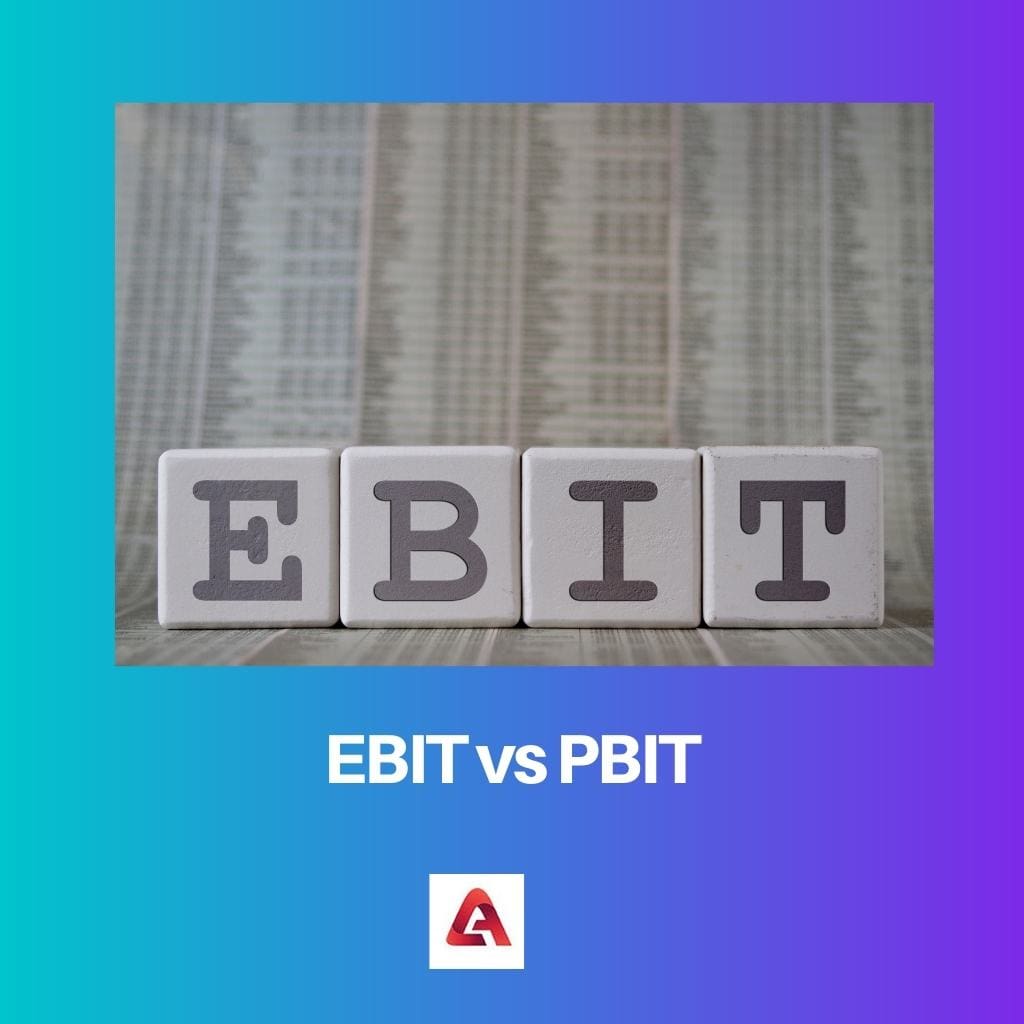EBIT (Earnings Before Interest and Taxes) refers to a company’s operating profit before deducting interest and taxes, providing insight into its operational efficiency. PBIT (Profit Before Interest and Taxes) is a broader metric, encompassing all profits before interest expenses but after deducting operating expenses, giving a more comprehensive view of profitability. While EBIT focuses solely on operating profit, PBIT accounts for non-operating income or expenses, offering a fuller picture of a company’s financial health.
Key Takeaways
- EBIT stands for earnings before interest and taxes, while PBIT stands for a profit before interest and taxes.
- EBIT is used to determine a company’s operating profitability, while PBIT shows the overall profitability of a company.
- EBIT excludes interest and taxes from operating expenses, while PBIT considers both interest and taxes in calculating a company’s profit.
EBIT vs PBIT
EBIT, or earnings before interest and taxes, represents a company’s operating profit before deducting interest expenses and income taxes. PBIT, or profit before interest and taxes, is similar to EBIT but includes non-operating income, such as investment income or gains from the sale of assets.

Comparison Table
| Feature | EBIT (Earnings Before Interest and Taxes) | PBIT (Profit Before Interest and Taxes) |
|---|---|---|
| Definition | Net income plus both interest expense and interest income | Net income plus only interest expense |
| Accounting Treatment | More widely used and standardized | Less common, may vary depending on accounting standards used |
| Components Excluded | Both interest expense and income tax expense | Only interest expense and not income tax expense |
| Purpose | Assess a company’s operating profitability, excluding financing decisions and tax impacts | Similar to EBIT, but might be relevant in specific situations like mergers and acquisitions |
| Impact of Capital Structure | Does not consider how a company finances its operations (debt vs. equity) | Ignores impact of debt financing on profitability |
| Comparison Across Companies | More reliable for comparing companies with different capital structures | Less suitable for direct comparison due to potential variations in accounting standards |
What is EBIT?
EBIT, commonly known as Operating Profit, is a financial metric that measures a company’s profitability by considering its earnings before deducting interest expenses and income taxes. It reflects the profit generated by a company’s core operations, excluding the impact of financing decisions and tax obligations.
Calculation
EBIT is calculated by subtracting operating expenses from gross revenue. Operating expenses include costs such as cost of goods sold (COGS), selling, general, and administrative expenses (SG&A), and depreciation and amortization. The formula for EBIT is:
EBIT=Revenue−OperatingExpenses
Importance
- Operational Efficiency: EBIT provides insights into a company’s ability to generate profit from its primary business activities. By focusing on operating income, EBIT allows investors and analysts to assess how well a company is managing its core operations.
- Comparative Analysis: EBIT facilitates comparisons between companies operating in the same industry or sector, as it eliminates the impact of financing and tax structures, providing a clearer view of operational performance.
- Financial Health: EBIT is a key indicator of a company’s financial health and sustainability. A positive EBIT indicates that a company’s operations are profitable before considering interest and taxes, which can be crucial for long-term viability and growth strategies.

What is PBIT?
PBIT, also known as Profit Before Interest and Taxes, is a financial metric that represents a company’s total profit before deducting interest expenses but after subtracting operating expenses, including non-operating income. It provides a comprehensive view of a company’s profitability by considering both operating and non-operating income or expenses.
Calculation
PBIT is calculated by subtracting all operating expenses from gross revenue and adding any non-operating income. Unlike EBIT, which only excludes interest and taxes, PBIT also accounts for non-operating income or expenses. The formula for PBIT is:
PBIT=Revenue−OperatingExpenses+Non−operatingIncome
Importance
- Comprehensive Profitability Analysis: PBIT offers a holistic perspective on a company’s profitability by considering all income and expenses, including non-operating items. This allows stakeholders to assess the overall financial performance of the company, including the impact of non-operating activities such as investments, asset sales, or one-time gains or losses.
- Financial Decision-Making: PBIT aids in financial decision-making by providing a more complete understanding of a company’s earning potential. It helps management evaluate the effectiveness of various strategies, such as investment decisions or cost management initiatives, by considering their impact on both operating and non-operating income.
- Investor Insight: Investors use PBIT to evaluate a company’s ability to generate profits from both its core operations and other income sources. By analyzing PBIT trends over time and comparing them with industry benchmarks, investors can assess the company’s overall financial health and investment attractiveness.

Main Differences Between EBIT and PBIT
- Scope of Expenses:
- EBIT focuses solely on operating expenses, excluding interest and taxes.
- PBIT considers both operating expenses and non-operating expenses, such as interest and taxes.
- Inclusion of Non-operating Income:
- EBIT does not incorporate non-operating income or expenses.
- PBIT includes non-operating income, providing a more comprehensive view of profitability.
- Comprehensiveness:
- EBIT provides a narrower view of profitability, focusing solely on operating profit.
- PBIT offers a more comprehensive perspective by considering both operating and non-operating income and expenses.
- Calculation Difference:
- EBIT is calculated as revenue minus operating expenses.
- PBIT is calculated as revenue minus operating expenses plus non-operating income.
- Financial Decision Making:
- EBIT is primarily used to assess operational efficiency and performance.
- PBIT aids in financial decision-making by providing a broader understanding of a company’s overall profitability and financial health.
- Investor Analysis:
- Investors use EBIT to gauge a company’s operational performance and efficiency.
- PBIT offers investors a more holistic view, allowing them to assess the impact of both operating and non-operating activities on a company’s profitability.